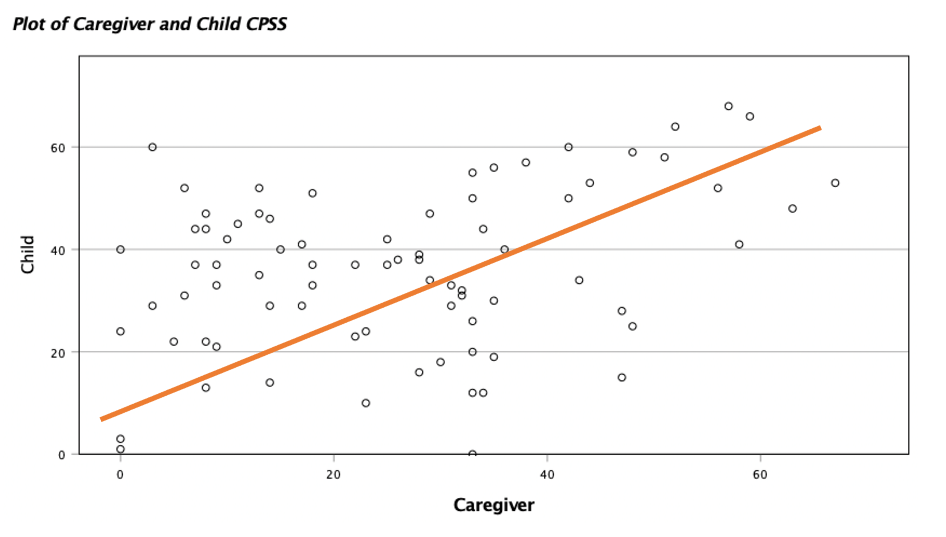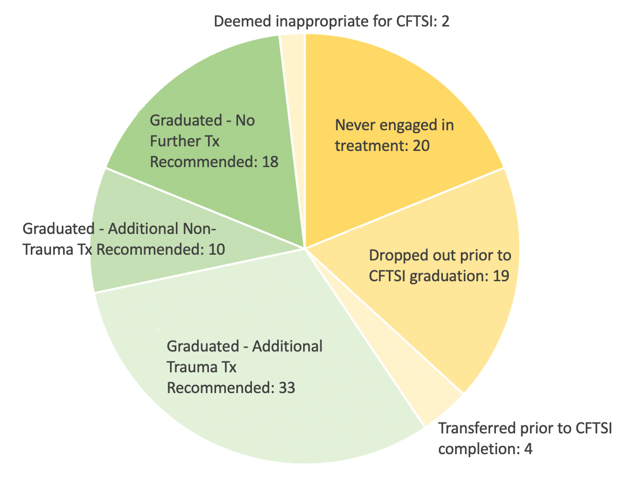Project CONTACT Notable Numbers Intro
Impact of Caregiver Symptomatology in CFTSI
The Child and Family Traumatic Stress Intervention is a conjoint model in which both the caregiver and child participate in treatment. We wanted to evaluate whether the impact of caregiver’s ratings of their own trauma symptomatology impacts any therapeutic processes or outcomes.
First, we note that Caregivers and Children are very congruent in their ratings of the Child’s Trauma symptomatology {r(78) = .34, p = .002}.

Client Graduation Rate from CFTSI
Continuing our theme of growth and change… This month Project CONTACT instituted a new method of tracking treatment disposition.
We have always been interested in knowing how many of our families graduate once they’ve entered our program. Historically, we’ve defined “success” by noting whether families complete all sessions of CFTSI. We further delineate whether families who finish our program require additional treatment at discharge.
Over time, however, we began to realize that there was an important distinction that were not capturing – namely whether families who needed additional treatment required trauma-focused treatment or some other type of mental health counseling.
Therefore, this month we reviewed all previous cases and identified this more nuanced definition of requiring additional treatment.
This graph presents the outcomes of all families discharged from our program to date:

Project CONTACT Staffing
Joel Epstein, PhD, serves as the project’s Principal Investigator. He has responsibility to ensure the grant is executed to the specifications of the funder. Philip Sher serves as the project’s Program Manager and is also a CFTSI clinician. They are supported by all the following hard working and dedicated staff:
CFTSI Clinicians (8)
Hechler, Charlotte
Mantia, Jessica
Melnick, Noga
Noguera, Felecia
Paul, Hannah
Selig, Samantha
Vanostran, Callie
Williams, Stephanie G.
Forensic Family Advocates (3)
Campbell, L’Oreal
Constant, Jessica
Neff, Courtney
Family Engagement Specialists (2)
Boyd, Catherine
Schultz, Susie
Intake Staff (2)
Buehrig, Kerstyn
Ward, Casey
Additional Support (3)
Dunn, Jerry
Norman, Sarah
Scott, Tenley
That’s a total of twenty individuals, all dedicated to making sure that families receive prompt and top-notch services.
It is also important to remember that we are a part of the University of Missouri – St. Louis. Consequently, we benefit from their infrastructure that provides us additional maintenance, technology, and financial services.

Finally, we see that there is no impact on whether families graduate from CFTSI or not based on the the degree of Caregiver symptomatology {F(1,42) = .007, p=.933}.

This represents a 58% graduation rate, which is comparable, if not better than published CFTSI studies. Not only are we proud of these outcomes, but we are also pleased that this means that nearly half (46%) of all families who graduate do not need further trauma treatment.

